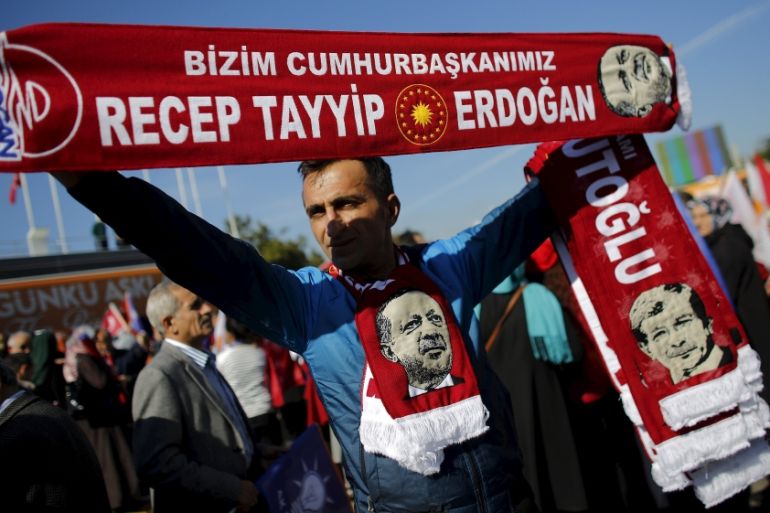Analysis: Will Turkey’s AKP push for systemic change?
Despite its surprise win, the polarising nature of changing political system means AKP is unlikely to act anytime soon.

Turkey’s governing AK Party has defied all expectations, winning a landslide victory in the country’s November 1 general election.
The party garnered approximately 49.5 percent of votes and 317 seats in parliament, an increase of 59 from the June 7 election result.
Keep reading
list of 4 itemsTurkish opposition wins major cities in local elections
What shapes Turkey’s municipal elections?
Turkey offers to host Russia-Ukraine peace talks as Erdogan hosts Zelenskyy
At this stage, the question that is on everyone’s mind is will this win be interpreted as support for a change in the political system from parliamentary rule to executive presidency by the governing AK Party and President Recep Tayyip Erdogan.
This issue was at the centre of the debate in June’s election, in which the governing AK Party not only failed to acquire the number of seats required for a super majority to change the constitution to make such an amendment, but also tooks less seats than needed to form a simple majority government.
Believing that there was no sufficient support for the change of political system in the country, and recognising that making it the central theme of its election campaign did not go down well with the voters, the AK Party refrained from focusing on changing the political system prior to the November 1 election.
Nevertheless, this does not mean that the party has completely shelved the idea of changing the system.
It still made reference to its desire for such change in its election manifesto for the November vote.
Though sporadic, and with lesser stress, some of the party officials still emphasise the need for to change the political system, arguing that this will make the task of governance smoother and more effective in the country.
Erdogan still makes the case for this in his public appearances.
Polarising nature
In spite of these, it does not seem that this issue will surface again very soon.
Two factors primarily accounts for this. First, despite the stunning victory, the AK Party is still short of a super majority in terms of its seats in parliament.
It received approximately 49.5 percent of vote, which translates into 317 MPs in parliament. But there are two ways that a party can make a constitutional change.
First, a proposal on the amendment of a constitutional change needs to receive the support of 330 MPs in parliament and the approval of the president for it to be able to be put to a referendum, in which it needs to receive more than 50 percent of the votes.
Second, if a party can attain a two-third majority, meaning 367 seats given that Turkey’s parliament is composed of 550 MPs, then it can eschew the referendum obligation.
In this scenario, it can introduce its desired constitutional change within the premise of the parliament.
The AK Party is currently short of both options. And all opposition parties represented in parliament have repeatedly expressed their opposition to such a systemic change, and are hence unlikely to support the AK Party in any such endeavour.
Second, in the run up to the June 7 elections, the AK Party put its desire to change the political system at the centre of its political campaign. But it failed to receive sufficient support for this.
Moreover, it also lost its majority in the parliament for the first since coming to power as a single-party government in 2002.
Political climate
Such a relatively low level of support for systemic change coupled with the polarising nature of this proposal makes it unlikely the AK Party will reinstate a debate on the subject anytime soon.
Therefore, it is not off the agenda, but not high on the agenda either.
If the AK Party finds the right political climate further down the road, it is likely that it will bring the issue back on the table.
But knowing how polarising the issue is, the AK Party is unlikely to put it at the centre of its political agenda any time soon.
Galip Dalay is senior associate fellow on Turkey and Kurdish Affairs at Al Jazeera Centre for Studies, and research director at Al Sharq Forum.